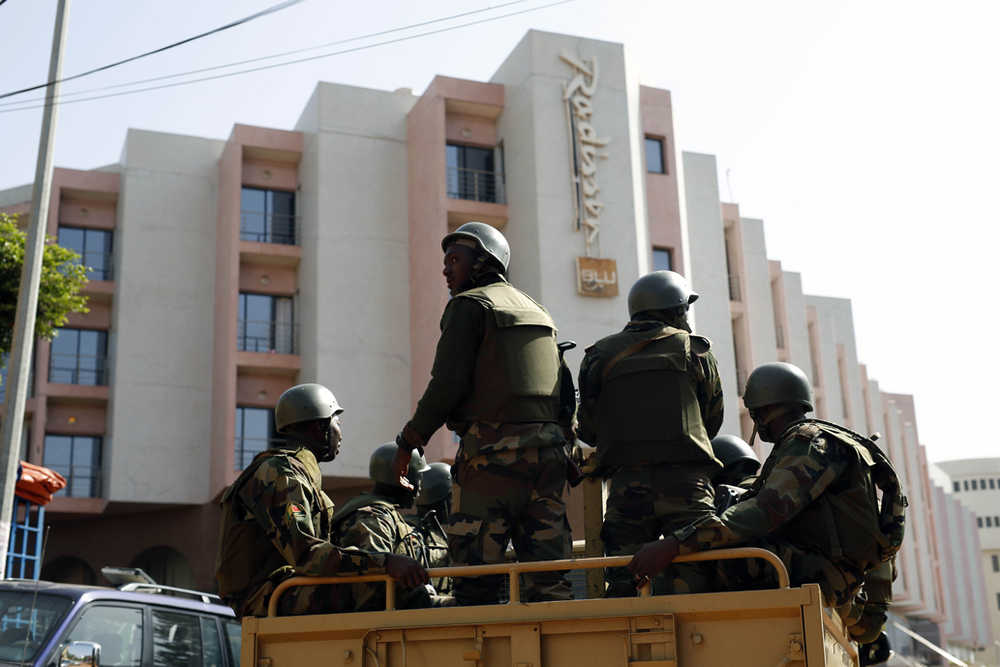BAMAKO, Mali — The heavily armed Islamic extremists who shot up a luxury hotel in Mali’s capital, killing 19 people, timed their assault for the moment when guards would be the most lax, allowing them to easily blast their way past a five-man security team before turning their weapons on terrified guests, a security guard and witnesses said Saturday.
The timing suggested a well-planned operation that analysts say could be an attempt by al-Qaida to assert its relevance amid high-profile attacks by the rival Islamic State group.
The attack on the Radisson Blu hotel in Bamako began at around 7 a.m. Friday morning when two gunmen, approaching on foot, reached the entrance where five guards who had worked the night shift were waiting to be replaced by a new team, said Cheick Dabo, one of the guards.
The guards had just finished the morning prayer and had put their weapons — a shotgun and two pistols — away in their vehicle when the militants struck.
“We didn’t see the jihadists until they started firing on us. We weren’t concentrating and we didn’t expect it,” he said.
Four of the guards were shot, one fatally, while Dabo himself managed to hide under a car.
Government critics have attacked the level of security at the hotel and in the country but Interior Minister Salif Traore said Saturday that there was little to be done in the face of such determined attackers.
“They were ready to die, so the level of security is hardly important,” he told reporters. “The Radisson hotel had a level of security that was considered good.”
Once inside, at least one of the assailants headed for the kitchen and restaurant, sparking pandemonium, said Mohammed Coulibaly, a cook at the hotel.
“I was busy cooking when a waitress started screaming at the door, ‘They are attacking us, they are attacking us!’” Coulibaly said. “I asked everyone to go into the hallway, so everyone headed in that direction. Suddenly we heard the footsteps of the jihadists behind us and there was total panic and people were running in every direction.”
Coulibaly said he then hid in a bathroom with one of the guests, but one of the assailants saw him through a window and started firing, prompting him to run to the kitchen where he was nearly overwhelmed by smoke.
“I realized that if I didn’t leave the kitchen the smoke would kill me. So I waited until I didn’t hear any noise and I ran from the kitchen and escaped the hotel through a window,” he said.
By that point, the assailants were heading upstairs where they took dozens of hostages, launching a standoff with Malian security forces that lasted more than seven hours and claimed 19 lives in addition to their own. All but one of the victims were hotel guests.
Speaking to reporters briefly after visiting the hotel on Saturday, Mali President Ibrahim Boubacar Keita said the attack underscored the global threat posed by Islamic extremists, especially coming just one week after teams of attackers from the Islamic State group in Paris killed 130 people while targeting a stadium, a concert hall and cafes and restaurants.
“These people have attacked Paris and other places. Nowhere is excluded,” Keita said.
Army Maj. Modibo Nama Traore said earlier Saturday that security forces were hunting “more than three” suspects who may have been involved in the assault. The government on Friday declared a 10-day nationwide state of emergency and three days of national mourning beginning Monday.
The Radisson attack was claimed by Al-Mourabitoun (The Sentinels), an extremist group formed by notorious Algerian militant Moktar Belmoktar, in a statement Friday that said it was carried out in cooperation with al-Qaida’s “Sahara Emirate.”
Belmoktar, an Algerian militant and former al-Qaida commander who has long been based in the Sahara, shot to prominence after his group carried out a January 2013 attack on an Algerian gas plant that resulted in the death of 39 foreign workers.
Jean-Herve Jezequel, an analyst with the International Crisis Group, said Al-Mourabitoun may be allying with al-Qaida in the face of the losses the extremists have suffered at the hands of French forces that intervened in Mali in 2013 after much of the north fell to radical Islamists.
“Belmoktar may want to revive the alliance with al-Qaida maybe to reassert their position because they have lost a lot,” he said. “They have lost a lot of leaders in the last three years because of the French military intervention.”
The attack may also be a way for al-Qaida and its allies to assert itself in the face of the highly publicized string of attacks carried out by its chief rival in jihad, the Islamic State group.
While IS does not have a major presence in this region, its successes elsewhere in the world have resulted in local radical groups pledging allegiance to it.
“Al-Qaida and its international affiliates have been surpassed by IS and needed to show that they are still there,” said Djallil Lounnes, an expert on radical groups in the Sahara based in Morocco. “The attack on the hotel was perfect — only foreign delegations in a highly secure area — so the message would be that we, al-Qaida, can strike high-quality targets, not just random civilians.”
Among the dead in the Radisson attack were a 41-year-old American development worker, six Russian plane crew from a cargo company, and three senior executives from the powerful state-owned China Railway Construction Corp., officials said.
__
The story has been corrected to show that the official toll from the attack is 19 victims dead, rather than 20.
__
Corey-Boulet reported from Abidjan, Ivory Coast. Associated Press writer Paul Schemm in Addis Ababa, Ethiopia contributed to this report.

